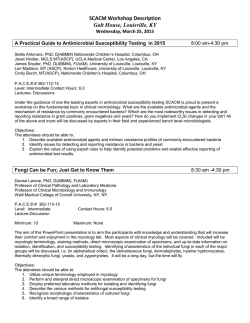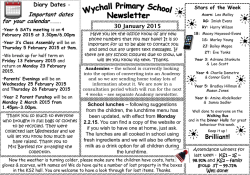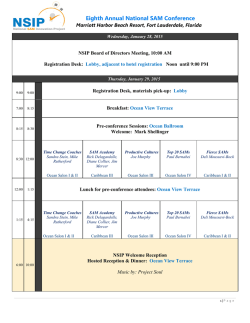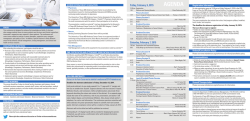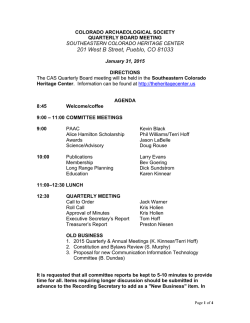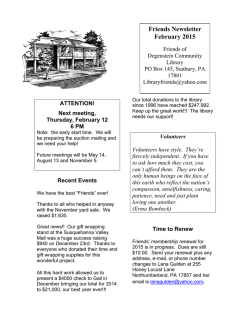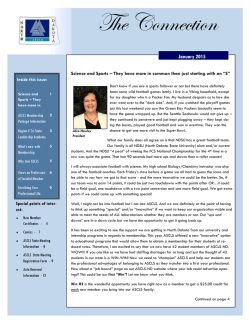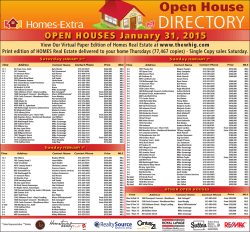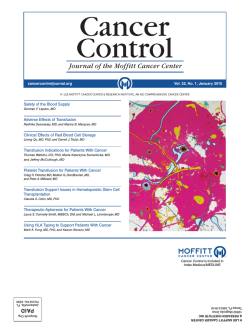
CLCC 2015 Program
CACMLE (Colorado Association for Continuing Medical Laboratory Education, Inc.) 6825 E. Tennessee Ave. Ste 111 Denver, Colorado 80224-1629 Phone: 303-321-1734 • Fax: 303-321-9231 email: [email protected] • Website: www.CACMLE.org Bring this Program with you to CLCC! Non-Profit Org US POSTAGE PAID Denver CO Permit No. 1203 A Clinical Laboratory Continuing Education event Organized by ASCLS-Colorado ASCLS-Wyoming CACMLE CLMA-Centennial Chapter April 9 – April 10, 2015 Schedule at a Glance Wednesday, April 8 5:00-7:00 pm ASCLS-CO Annual Meeting 7:00-9:00 pm Bowling Thursday, April 9 7:00-9:00 Registration and Continental Breakfast 8:00-8:45 Opening Ceremony and Awards 8:45-9:45 Keynote 9:45–10:00 Break 10:00-11:00 Breakout Sessions 11:00-1:30 PM Lunch with Vendors 1:30-2:30 Breakout Sessions 2:30-2:45 Break 2:45-3:45 Breakout Sessions 3:45–4:00 Break 4:00-5:00 Breakout Sessions 5:00-7:30 CACMLE Reception 7:30-8:45 ASCLS-WY Annual Meeting Friday, April 10 7:00-9:00 Registration and Continental Breakfast 8:00-8:45 Opening Ceremony & Student Awards 8:45-9:45 General Session 9:45-10:00 Break 10:00-11:00 Breakout Sessions 11:00-1:30 Lunch with Vendors 1:30-2:30 Breakout Sessions 2:30-2:45 Break 2:45-3:45 Breakout Sessions 3:45-4:00 Break 4:00-5:00 Breakout Sessions * Please bring this program to the conference ** Program schedule is tentative and subject to change Come Visit Us Online www.clcconline.org Prior to attending the conference, attendees will need to print handouts by visiting the above website. A username and password is required for printing conference materials and will be provided with your registration confirmation via email. Handouts will NOT be provided at the session. Directions and a map to the hotel are available online. Online Registration will be available beginning February 1, 2015 at www.clcconline.org CACMLE Reception Thursday, April 9, 5:00-7:30 p.m. Refreshments Served, Cash Bar, Silent Auction and Entertainment in the Colorado Room ASCLS-CO Annual meeting, Wednesday, April 8, 5:00-7:00 p.m. Room TBA. ASCLS-WY Annual meeting, Thursday, April 9, 7:30-8:45 p.m. Room TBA. *** Visit the Student Posters all day Thursday and Friday. Prizes will be awarded for 1st, 2nd, 3rd place and honorable mentions. ~~~~~~~~~~~~~~~~~~~~~~~~~~~~~~~~~~~~ Visit the Student Poster Session each day. Earn an additional 1 CEU for completing a Student Poster Quiz. Breakout Sessions Friday, April 10, 2015 • 2:45 – 3:45pm Session #21: Interview Skills — Kim Miller MT (ASCP), Quest Diagnostics Explore Interviewing process, discuss common interview questions and practice a competency based interview. Session #22: Transfusion Reactions — Anna Cobb, MT (ASCP) SBB, Cheyenne Regional Medical Center A review of the different types of transfusion reactions, signs and symptoms associated with transfusion reactions, and laboratory’s role in the transfusion reaction work up. Session #23: Interesting Case Studies in Genetics: from the Laboratory to the Patient — Leslie Ross, MS, University of Colorado Health This session will review several real-life genetics testing cases involving advanced genetics technology, walking the audience through the patient experience, the laboratory experience, and the clinician’s experience. Friday, April 10, 2015 • 4:00 – 5:00pm Session #24: Resume Writing — Theresa Barbre, MT (ASCP), Cheyenne VA Medical Center Examine Resume styles, the do’s and don’ts to include and benefit of an opening cover sheet. Session #25: Fecal Microbiota Transplant Kristie Devore, BSN, and Misty Bever, ADN, Poudre Valley Hospital A review of the historical use of Fecal Microbiota Transplant (FMT), how it fell out of favor, & came back as an alternative treatment for recurrent C. difficile infections. A carefully planned out procedural process is necessary for recipient and donor and should continually evolve as new and improved strategies emerge. Session #26: Intro to Liquid Chromatography & Mass Spectrometry — Matt Clabaugh, BS, AB SCIEX This session will include an introduction to LC-MS/MS (Liquid chromatographytandem mass spectrometry) for the Clinical Lab, encompassing both the technology and application. The advantages of its use as a direct analyte measurement for increased accuracy. The ability of LCMS/MS to expand the laboratories capabilities and reduce high value send-out tests. Thank You to Our Sponsors Wyoming Department of Health Labs Casper College Sysmex America Bonfils Blood Center Bio-Rad Laboratories, Inc. Cheyenne VA Medical Center Montana State Public Health Labs University of Colorado Health System VA Eastern Colorado Health System University of Colorado Denver CLMA Centennial Chapter Children’s Hospital Colorado Stago Diagnostica Cheyenne Regional Medical Center AB Sciex Parkview Medical Center Quest Diagnostics Breakout Sessions General Sessions Friday, April 10, 2015 • 10:00 – 11:00am Session #15: Train Tracks, Buttons, & Fat Men: A Balanced Approach to the Ethical Dilemma CM — Jenney Mead, MLS(ASCP) , MBA, Parkview Medical Center When our values come into conflict it can be difficult to know what to do. This session will use a fun, interactive approach to explore the pitfalls of ethical dilemmas. A process for resolving these issues will be outlined to help you make difficult decisions in the future. Session #16: Digital Microscopic Hematology & Case Studies CM — Bernardino D. Madsen, MS, MLS (ASCP) , Casper College This session will utilize digital microscopic video of blood smears as a means to showcase and discuss specific hematology cases. Session #17: Diagnostic Methodologies for Identification of Carbapenem Resistant Enterobacteriaceae and Vancomycin-Intermediate/Resistant Staphylococcus aureus — Sarah Buss, PhD, D(ABMM), Wyoming Public Health Laboratory The mechanisms involved with carbapenem resistance in Enterobacteriaceae and resistance or decreased susceptibility to vancomycin in Staphylococcus aureus will be introduced. Laboratory methods used to detect carbapenem-resistant Enterobacteriaceae and Vancomycin-Intermediate/Resistant Staphylococcus aureus will be discussed in detail, with emphasis on the merits of testing and strengths and weaknesses of each method. Breakout Sessions Friday, April 10, 2015 • 1:30 – 2:30pm Session #18: BOC, ASCLS, CM, CACMLE. What do they all mean? CM — Jenney Mead, MLS(ASCP) , MBA, Parkview Medical Center This session will help you navigate the alphabet soup of national organizations that exist in the laboratory profession. We will discuss the functions of the various organizations and ways to leverage membership in these organizations to climb the career ladder. The process for the ASCP certification maintenance program will be outlined in detail. Session #19: Virtual Microscopy for Hematology — H. Elizabeth Broome, MD, UC San Diego This session will compare blood smear review by microscope versus digital blood smear imaging systems with particular focus on Cellavision. Discussed aspects of the systems will include technical abilities, integration with clinical laboratory automation, technical limitations, and cost. Case studies will illustrate the main discussion points. Session #20: New Developments in Molecular Microbiology: When to Stick With the Tried and True and When To Take the Jump — Amy B. Frey, DO (FASCP), MS, VA Eastern Colorado Health System, & University of Colorado-Denver, School of Medicine This presentation encompasses new molecular protocols which are currently in use, or are being formulated for clinical microbiology laboratories. Practical considerations are discussed to determine which protocols may be appropriate for a given institution. New research involving detection of bacteria, fungi, viruses and parasites, as well as genes for antibiotic resistance will be presented. Thursday, April 9, 2015 • 8:45 - 9:45am Session #1 Keynote Address Public Health Field Response to Ebola Virus in Sierra Leone, 2014 — Daniel R. O’Leary, DVM, DACVPM, CDC, Wyoming Department of Health This session will review Ebola virus epidemiology in a high-transmission district of Sierra Leone and describe elements and implementation of the front-line public health response. Brandy Russell, from the CDC will join Dr. O’Leary to discuss challenges faced in a CDC field lab in Bo, Sierra Leone. Friday, April 10, 2015 • 8:45 – 9:45am Session #14 General Session Welcome to Jurassic Lab! — Jim Faix, MD - Stanford University School of Medicine Sponsored by Bio-Rad Laboratories are (once again) focusing on inappropriate testing as a way to save money and enhance patient care. Let’s take a tour and see some of the dinosaurs laboratory tests whose time has come and gone but are still being requested. ~~~~~~~~~~~~~~~~~~~~~~~~~~~~~~~~~~~~ Please visit with your vendors in the exhibits area each day. We are grateful for their continued support and want them to have the greatest opportunity to speak with their customers during this event. Earn an additional 1 CEU for completing a Vendor Quiz. Hotel Information Radisson Hotel, Denver Southeast, 3155 S. Vaughn Way, Aurora, CO 80014 For Room Reservations call: (800) 967-9033 Reference Conference as 1504CACMLE or CLCC for Group Rate Room Rate! $89/night Call by 3/26/15 in order to guarantee a room at the conference rate. Directions to hotel available at www.clcconline.org Breakout Sessions Breakout Sessions Thursday, April 9, 2015 • 10:00 - 11:00 am Thursday, April 9, 2015 • 2:45 - 3:45pm Session #2: Size and Shape Matter: Why We Care About RBC Morphology — Kathryn Hassell, MD, University of Colorado Denver Laboratory characterization of red blood cells guides clinical decision-making. Key parameters include RBC number, MCV and the presence of abnormal morphology (e.g. spherocytes, target cells). Cases will be used to illustrate important findings and incorporate other laboratory features to allow laboratory professionals to directly impact patient diagnosis and management. Session #8: Transfusion-Related Acute Lung Injury — Kelley E. Capocelli, MD, Children's Hospital Colorado This session will discuss Transfusion-Related Acute Lung Injury (TRALI), defining signs and symptoms and the laboratory work-up suggested to diagnose its occurrence. The proposed etiologies of TRALI will be presented. In addition, TRALI mitigation strategies and limitations to such strategies will also be explored. Session # 3: The Role of Molecular Immunohematology in Reference Lab CM — Chris McCarty BB(ASCP)SBB , Bonfils Blood Center Molecular phenotyping has changed the way difficult patient work-ups are confronted. The implementation of a strong molecular program in a reference lab allows for greater understanding of a patient’s potential antibody risk as well as increasing the likelihood of finding compatible blood for transfusion. Session #4: Navigating the Changing Landscape of Laboratory Science CM — Susie Zanto, MPH, MLS(ASCP) , SM(NRCM), ASCLS President & Montana Public Health Laboratory This session will discuss the laboratory issues that are affecting the practice of clinical laboratory science, including the laboratory workforce, legislation, and government regulations, and how laboratory organizations and their engaged members are addressing these issues. Thursday, April 9, 2015 • 1:30 - 2:30pm Session #5: Microbiology Case Studies CM — Susie Zanto, MPH, MLS(ASCP) , SM(NRCM), ASCLS President & Montana Public Health Laboratory This interactive session will allow participants to challenge their knowledge base by using audience response devices to solve microbiology case studies. These case studies will discuss recent and emerging infectious diseases and as part of the discussion, the importance of the partnership between clinical and public health laboratories will be emphasized. Session #6: Metabolic Syndrome: A Numbers Game CM — Mary Ann McLane, PhD, MLS(ASCP) , University of Delaware Sponsored by CLMA Centennial Chapter Metabolic syndrome involves a group of risk factors that occur together and increase the risk for coronary artery disease, stroke, and type 2 diabetes mellitus. This seminar will summarize the diagnostic numbers which suggest it is present and outline the critical role of the lab professional in its diagnosis. Session #7: Preparing for CLIA Surveys — Margi Haas, MT(ASCP), Centers for Medicare and Medicaid Services (CMS) A CLIA survey is a review of your policies, procedures, and documentation. The focus of the survey is assessing how the laboratory monitors its operations to ensure the quality of its testing. This presentation will cover the primary process of a survey and the pillars of quality and reliable testing. INSTITUTIONAL PASS: The institutional pass costs $300.00, is good for both days, and includes any combination of general sessions and breakouts up to a total of 12. Meal Tickets are not included in this pricing. Additional single sessions may be purchased for $25.00 per session. All participants are welcome to visit the vendors in the exhibit hall. Note that General Sessions are 1 and 14. Session #9: Anticoagulants & Monitoring: Past, Present and Future — Claudia E. Escobar MT(ASCP)SH, Diagnostica Stago A review of the anticoagulants used for venous thromboembolism (VTE) from the past, present and future will be reviewed along with their monitoring/measurement recommendations and the assays required to do so. Session #10: Keeping Secrets in the Lab CM — Mary Ann McLane, PhD, MLS(ASCP) , University of Delaware Sponsored by CLMA Centennial Chapter Every year virtually every clinical lab staff performs CQI to better serve their patients and clinicians. However, most of these improvements go unnoticed since they are not published. This presentation discusses the importance of publicizing the improvements in laboratory services. Thursday, April 9, 2015 • 4:00 – 5:00pm 131 Session #11: I -MIBG Therapy for Neuroblastoma: The Development of a Targeted Radiopharmaceutical — Margaret Macy, MD, University of Colorado and Children’s Hospital Colorado This session will focus on the development of I131 MIBG as a therapy for the pediatric tumor, neuroblastoma. Specifically, the history of this radiopharmaceutical as current indications will be discussed. Session #12: Molecular Diagnostics for Infectious Diseases: You Can Do It! cm — Lana Fairbanks MT(ASCP)SM , Parkview Medical Center — Nikki Fette MT(ASCP), NCA, Parkview Medical Center Molecular diagnostics can impact the diagnosis, treatment and care of patients with infectious diseases. We will discuss the challenges associated with justifying the higher cost per test to administration and review the complexities involved in test validation. The importance of educating the healthcare team on the benefits and limitations of this new technology will also be discussed. Session #13: CLIA & Individualized Quality Control Plan (IQCP) — Margi Haas, MT(ASCP), Centers for Medicare and Medicaid Services (CMS) This presentation explains the background and history of QC, the development and purpose of the new IQCP program, the regulations to which IQCP applies and what to expect during a survey that occurs within the education and transition period. This presentation also provides guidance on how to begin preparation for developing your own IQCP. Breakout Sessions Breakout Sessions Thursday, April 9, 2015 • 10:00 - 11:00 am Thursday, April 9, 2015 • 2:45 - 3:45pm Session #2: Size and Shape Matter: Why We Care About RBC Morphology — Kathryn Hassell, MD, University of Colorado Denver Laboratory characterization of red blood cells guides clinical decision-making. Key parameters include RBC number, MCV and the presence of abnormal morphology (e.g. spherocytes, target cells). Cases will be used to illustrate important findings and incorporate other laboratory features to allow laboratory professionals to directly impact patient diagnosis and management. Session #8: Transfusion-Related Acute Lung Injury — Kelley E. Capocelli, MD, Children's Hospital Colorado This session will discuss Transfusion-Related Acute Lung Injury (TRALI), defining signs and symptoms and the laboratory work-up suggested to diagnose its occurrence. The proposed etiologies of TRALI will be presented. In addition, TRALI mitigation strategies and limitations to such strategies will also be explored. Session # 3: The Role of Molecular Immunohematology in Reference Lab CM — Chris McCarty BB(ASCP)SBB , Bonfils Blood Center Molecular phenotyping has changed the way difficult patient work-ups are confronted. The implementation of a strong molecular program in a reference lab allows for greater understanding of a patient’s potential antibody risk as well as increasing the likelihood of finding compatible blood for transfusion. Session #4: Navigating the Changing Landscape of Laboratory Science CM — Susie Zanto, MPH, MLS(ASCP) , SM(NRCM), ASCLS President & Montana Public Health Laboratory This session will discuss the laboratory issues that are affecting the practice of clinical laboratory science, including the laboratory workforce, legislation, and government regulations, and how laboratory organizations and their engaged members are addressing these issues. Thursday, April 9, 2015 • 1:30 - 2:30pm Session #5: Microbiology Case Studies CM — Susie Zanto, MPH, MLS(ASCP) , SM(NRCM), ASCLS President & Montana Public Health Laboratory This interactive session will allow participants to challenge their knowledge base by using audience response devices to solve microbiology case studies. These case studies will discuss recent and emerging infectious diseases and as part of the discussion, the importance of the partnership between clinical and public health laboratories will be emphasized. Session #6: Metabolic Syndrome: A Numbers Game CM — Mary Ann McLane, PhD, MLS(ASCP) , University of Delaware Sponsored by CLMA Centennial Chapter Metabolic syndrome involves a group of risk factors that occur together and increase the risk for coronary artery disease, stroke, and type 2 diabetes mellitus. This seminar will summarize the diagnostic numbers which suggest it is present and outline the critical role of the lab professional in its diagnosis. Session #7: Preparing for CLIA Surveys — Margi Haas, MT(ASCP), Centers for Medicare and Medicaid Services (CMS) A CLIA survey is a review of your policies, procedures, and documentation. The focus of the survey is assessing how the laboratory monitors its operations to ensure the quality of its testing. This presentation will cover the primary process of a survey and the pillars of quality and reliable testing. INSTITUTIONAL PASS: The institutional pass costs $300.00, is good for both days, and includes any combination of general sessions and breakouts up to a total of 12. Meal Tickets are not included in this pricing. Additional single sessions may be purchased for $25.00 per session. All participants are welcome to visit the vendors in the exhibit hall. Note that General Sessions are 1 and 14. Session #9: Anticoagulants & Monitoring: Past, Present and Future — Claudia E. Escobar MT(ASCP)SH, Diagnostica Stago A review of the anticoagulants used for venous thromboembolism (VTE) from the past, present and future will be reviewed along with their monitoring/measurement recommendations and the assays required to do so. Session #10: Keeping Secrets in the Lab CM — Mary Ann McLane, PhD, MLS(ASCP) , University of Delaware Sponsored by CLMA Centennial Chapter Every year virtually every clinical lab staff performs CQI to better serve their patients and clinicians. However, most of these improvements go unnoticed since they are not published. This presentation discusses the importance of publicizing the improvements in laboratory services. Thursday, April 9, 2015 • 4:00 – 5:00pm 131 Session #11: I -MIBG Therapy for Neuroblastoma: The Development of a Targeted Radiopharmaceutical — Margaret Macy, MD, University of Colorado and Children’s Hospital Colorado This session will focus on the development of I131 MIBG as a therapy for the pediatric tumor, neuroblastoma. Specifically, the history of this radiopharmaceutical as current indications will be discussed. Session #12: Molecular Diagnostics for Infectious Diseases: You Can Do It! cm — Lana Fairbanks MT(ASCP)SM , Parkview Medical Center — Nikki Fette MT(ASCP), NCA, Parkview Medical Center Molecular diagnostics can impact the diagnosis, treatment and care of patients with infectious diseases. We will discuss the challenges associated with justifying the higher cost per test to administration and review the complexities involved in test validation. The importance of educating the healthcare team on the benefits and limitations of this new technology will also be discussed. Session #13: CLIA & Individualized Quality Control Plan (IQCP) — Margi Haas, MT(ASCP), Centers for Medicare and Medicaid Services (CMS) This presentation explains the background and history of QC, the development and purpose of the new IQCP program, the regulations to which IQCP applies and what to expect during a survey that occurs within the education and transition period. This presentation also provides guidance on how to begin preparation for developing your own IQCP. Breakout Sessions General Sessions Friday, April 10, 2015 • 10:00 – 11:00am Session #15: Train Tracks, Buttons, & Fat Men: A Balanced Approach to the Ethical Dilemma CM — Jenney Mead, MLS(ASCP) , MBA, Parkview Medical Center When our values come into conflict it can be difficult to know what to do. This session will use a fun, interactive approach to explore the pitfalls of ethical dilemmas. A process for resolving these issues will be outlined to help you make difficult decisions in the future. Session #16: Digital Microscopic Hematology & Case Studies CM — Bernardino D. Madsen, MS, MLS (ASCP) , Casper College This session will utilize digital microscopic video of blood smears as a means to showcase and discuss specific hematology cases. Session #17: Diagnostic Methodologies for Identification of Carbapenem Resistant Enterobacteriaceae and Vancomycin-Intermediate/Resistant Staphylococcus aureus — Sarah Buss, PhD, D(ABMM), Wyoming Public Health Laboratory The mechanisms involved with carbapenem resistance in Enterobacteriaceae and resistance or decreased susceptibility to vancomycin in Staphylococcus aureus will be introduced. Laboratory methods used to detect carbapenem-resistant Enterobacteriaceae and Vancomycin-Intermediate/Resistant Staphylococcus aureus will be discussed in detail, with emphasis on the merits of testing and strengths and weaknesses of each method. Breakout Sessions Friday, April 10, 2015 • 1:30 – 2:30pm Session #18: BOC, ASCLS, CM, CACMLE. What do they all mean? CM — Jenney Mead, MLS(ASCP) , MBA, Parkview Medical Center This session will help you navigate the alphabet soup of national organizations that exist in the laboratory profession. We will discuss the functions of the various organizations and ways to leverage membership in these organizations to climb the career ladder. The process for the ASCP certification maintenance program will be outlined in detail. Session #19: Virtual Microscopy for Hematology — H. Elizabeth Broome, MD, UC San Diego This session will compare blood smear review by microscope versus digital blood smear imaging systems with particular focus on Cellavision. Discussed aspects of the systems will include technical abilities, integration with clinical laboratory automation, technical limitations, and cost. Case studies will illustrate the main discussion points. Session #20: New Developments in Molecular Microbiology: When to Stick With the Tried and True and When To Take the Jump — Amy B. Frey, DO (FASCP), MS, VA Eastern Colorado Health System, & University of Colorado-Denver, School of Medicine This presentation encompasses new molecular protocols which are currently in use, or are being formulated for clinical microbiology laboratories. Practical considerations are discussed to determine which protocols may be appropriate for a given institution. New research involving detection of bacteria, fungi, viruses and parasites, as well as genes for antibiotic resistance will be presented. Thursday, April 9, 2015 • 8:45 - 9:45am Session #1 Keynote Address Public Health Field Response to Ebola Virus in Sierra Leone, 2014 — Daniel R. O’Leary, DVM, DACVPM, CDC, Wyoming Department of Health This session will review Ebola virus epidemiology in a high-transmission district of Sierra Leone and describe elements and implementation of the front-line public health response. Brandy Russell, from the CDC will join Dr. O’Leary to discuss challenges faced in a CDC field lab in Bo, Sierra Leone. Friday, April 10, 2015 • 8:45 – 9:45am Session #14 General Session Welcome to Jurassic Lab! — Jim Faix, MD - Stanford University School of Medicine Sponsored by Bio-Rad Laboratories are (once again) focusing on inappropriate testing as a way to save money and enhance patient care. Let’s take a tour and see some of the dinosaurs laboratory tests whose time has come and gone but are still being requested. ~~~~~~~~~~~~~~~~~~~~~~~~~~~~~~~~~~~~ Please visit with your vendors in the exhibits area each day. We are grateful for their continued support and want them to have the greatest opportunity to speak with their customers during this event. Earn an additional 1 CEU for completing a Vendor Quiz. Hotel Information Radisson Hotel, Denver Southeast, 3155 S. Vaughn Way, Aurora, CO 80014 For Room Reservations call: (800) 967-9033 Reference Conference as 1504CACMLE or CLCC for Group Rate Room Rate! $89/night Call by 3/26/15 in order to guarantee a room at the conference rate. Directions to hotel available at www.clcconline.org Schedule at a Glance Wednesday, April 8 5:00-7:00 pm ASCLS-CO Annual Meeting 7:00-9:00 pm Bowling Thursday, April 9 7:00-9:00 Registration and Continental Breakfast 8:00-8:45 Opening Ceremony and Awards 8:45-9:45 Keynote 9:45–10:00 Break 10:00-11:00 Breakout Sessions 11:00-1:30 PM Lunch with Vendors 1:30-2:30 Breakout Sessions 2:30-2:45 Break 2:45-3:45 Breakout Sessions 3:45–4:00 Break 4:00-5:00 Breakout Sessions 5:00-7:30 CACMLE Reception 7:30-8:45 ASCLS-WY Annual Meeting Friday, April 10 7:00-9:00 Registration and Continental Breakfast 8:00-8:45 Opening Ceremony & Student Awards 8:45-9:45 General Session 9:45-10:00 Break 10:00-11:00 Breakout Sessions 11:00-1:30 Lunch with Vendors 1:30-2:30 Breakout Sessions 2:30-2:45 Break 2:45-3:45 Breakout Sessions 3:45-4:00 Break 4:00-5:00 Breakout Sessions * Please bring this program to the conference ** Program schedule is tentative and subject to change Come Visit Us Online www.clcconline.org Prior to attending the conference, attendees will need to print handouts by visiting the above website. A username and password is required for printing conference materials and will be provided with your registration confirmation via email. Handouts will NOT be provided at the session. Directions and a map to the hotel are available online. Online Registration will be available beginning February 1, 2015 at www.clcconline.org CACMLE Reception Thursday, April 9, 5:00-7:30 p.m. Refreshments Served, Cash Bar, Silent Auction and Entertainment in the Colorado Room ASCLS-CO Annual meeting, Wednesday, April 8, 5:00-7:00 p.m. Room TBA. ASCLS-WY Annual meeting, Thursday, April 9, 7:30-8:45 p.m. Room TBA. *** Visit the Student Posters all day Thursday and Friday. Prizes will be awarded for 1st, 2nd, 3rd place and honorable mentions. ~~~~~~~~~~~~~~~~~~~~~~~~~~~~~~~~~~~~ Visit the Student Poster Session each day. Earn an additional 1 CEU for completing a Student Poster Quiz. Breakout Sessions Friday, April 10, 2015 • 2:45 – 3:45pm Session #21: Interview Skills — Kim Miller MT (ASCP), Quest Diagnostics Explore Interviewing process, discuss common interview questions and practice a competency based interview. Session #22: Transfusion Reactions — Anna Cobb, MT (ASCP) SBB, Cheyenne Regional Medical Center A review of the different types of transfusion reactions, signs and symptoms associated with transfusion reactions, and laboratory’s role in the transfusion reaction work up. Session #23: Interesting Case Studies in Genetics: from the Laboratory to the Patient — Leslie Ross, MS, University of Colorado Health This session will review several real-life genetics testing cases involving advanced genetics technology, walking the audience through the patient experience, the laboratory experience, and the clinician’s experience. Friday, April 10, 2015 • 4:00 – 5:00pm Session #24: Resume Writing — Theresa Barbre, MT (ASCP), Cheyenne VA Medical Center Examine Resume styles, the do’s and don’ts to include and benefit of an opening cover sheet. Session #25: Fecal Microbiota Transplant Kristie Devore, BSN, and Misty Bever, ADN, Poudre Valley Hospital A review of the historical use of Fecal Microbiota Transplant (FMT), how it fell out of favor, & came back as an alternative treatment for recurrent C. difficile infections. A carefully planned out procedural process is necessary for recipient and donor and should continually evolve as new and improved strategies emerge. Session #26: Intro to Liquid Chromatography & Mass Spectrometry — Matt Clabaugh, BS, AB SCIEX This session will include an introduction to LC-MS/MS (Liquid chromatographytandem mass spectrometry) for the Clinical Lab, encompassing both the technology and application. The advantages of its use as a direct analyte measurement for increased accuracy. The ability of LCMS/MS to expand the laboratories capabilities and reduce high value send-out tests. Thank You to Our Sponsors Wyoming Department of Health Labs Casper College Sysmex America Bonfils Blood Center Bio-Rad Laboratories, Inc. Cheyenne VA Medical Center Montana State Public Health Labs University of Colorado Health System VA Eastern Colorado Health System University of Colorado Denver CLMA Centennial Chapter Children’s Hospital Colorado Stago Diagnostica Cheyenne Regional Medical Center AB Sciex Parkview Medical Center Quest Diagnostics
© Copyright 2026
